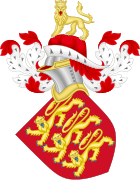The Statute of Merton or Provisions of Merton (Latin: Provisiones de Merton, or Stat. Merton), sometimes also known as the Ancient Statute of Merton, was a statute passed by the Parliament of England in 1235 during the reign of Henry III. It is considered to be the first English statute, and is printed as the first statute in The Statutes of the Realm. Containing 11 chapters, the terms of the statute were agreed at Merton between Henry[1] and the barons of England in 1235. It was another instance, along with Magna Carta twenty years previously, of the struggle between the barons and the king to limit the latter's rights.
 | |
| Citation | 20 Hen. 3 |
|---|---|
| Introduced by | Barons of the Peerage of England[a] |
| Dates | |
| Royal assent | 1235 by Henry III of England |
| Other legislation | |
| Relates to | Magna Carta |
Status: Repealed | |

Amongst its provisions, the statute allowed a Lord of the Manor to enclose common land provided that sufficient pasture remained for his tenants, and set out when and how manorial lords could assert rights over waste land, woods, and pastures against their tenants.[2] It quickly became a basis for English common law, developing and clarifying legal concepts of ownership, and was one of the English statutes carried over into the law of the Lordship of Ireland.
Having long been disused, it was revived under Duke of Northumberland John Dudley in January 1550 to enable lords to enclose their land at their own discretion, out of keeping with the traditional Tudor anti-enclosure attitude.
The Statute also dealt with illegitimacy[3] – stating that "He is a bastard that is born before the marriage of his parents". It also dealt with women's rights – dowries ("A woman shall recover damages in a writ of dower"), and widows' right to bequeath land ("Widows may bequeath the crop of their lands").[4]
Chapter 4 of this statute was the Commons Act 1236.
Chapters 1 and 2 and 9 were repealed for the Republic of Ireland by section 8 of, and Part I of Schedule 2 to, the Succession Act, 1965, subject to the savings in section 9 of that Act. The whole statute was repealed for that Republic by section 1 of, and Part 2 of the Schedule to, the Statute Law Revision Act 1983.
Dating and nomenclature
editThe statute was passed in 1235 and is named after Merton, where it was passed. It is considered the first English statute.[5] Magna Carta was initially enacted in 1215 and is counted as a statute by some sources as early as 1225;[5] however, The Statutes of the Realm does not consider it as a statute prior to a 1297 confirmation.[5] The Charter of the Forest had been passed in 1217 but is not considered a statute.
See also
editNotes
edit- ^ The division of Parliament into the House of Lords and the House of Commons would not occur until 1341; Parliament met as a unitary body at the time of the passage of the Statute of Merton.
References
edit- ^ Merton's New Religious House Consecrated
- ^ Journals of the House of Commons (1803 reprint) Volume 27, page 574, originally published 1756
- ^ 1788 – Before European Settlement
- ^ "Archives of Maryland, Volume 0143, Page 0262 - Kilty's English Statutes, 1811".
- ^ a b c Chisholm, Hugh, ed. (1911). . Encyclopædia Britannica. Vol. 25 (11th ed.). Cambridge University Press.
External links
edit- List of repeals in the Republic of Ireland from the Irish Statute Book.